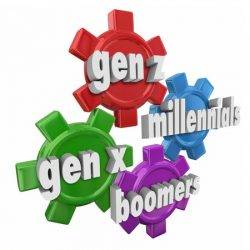September 12, 2016
Overwork and burnout affects all the generations in the workplace 0
Millennials, Gen X, and Boomers are all feeling overworked and burned out, which is motivating many to look for another job; and according to the latest Staples Business Advantage 2016 Workplace Index it’s the older workers who are most motivated at work by a sense of purpose, with Baby Boomers (46 percent) and Generation X (32 percent) having more of a sense of purpose at work than their younger Millennial counterparts (24 percent). Fifty percent of Millennials, 47 percent of Gen X, and 35 percent of Boomers however, say burnout is driving them to look for another job; with Boomers wishing their employer would decrease their workload and provide more time to complete tasks, while Gen X and Millennials are looking for a more flexible schedule and work-life blend. Aesthetics in the office are also key, regardless of age, as 51 percent of Millennials, 44 percent of Gen X, and 33 percent of Boomers would like to see more attention paid to office design.










 New research from AXA suggests that small firms are sceptical about the prospects of technologies such as 3D printing, robotics and driverless cars affecting their workplace in the near future. While more than 40 per cent of small businesses still don’t have a website, the study of 898 firms claims that most of these plan to move online in the next twelve months. If these plans are fulfilled, only seven per cent of UK businesses will remain offline by this time next year. However, just one in five plan to migrate to the Cloud and only six per cent say they expect to adopt smart technologies. Driverless cars, which are set to hit UK roads as early as 2020, have an equally low resonance, as just eight per cent of business owners expect they will travel in one. Businesses were also highly sceptical when it comes to 3D printing. Just two per cent of UK businesses who might use the process expect to see it used here ‘during their lifetimes’.
New research from AXA suggests that small firms are sceptical about the prospects of technologies such as 3D printing, robotics and driverless cars affecting their workplace in the near future. While more than 40 per cent of small businesses still don’t have a website, the study of 898 firms claims that most of these plan to move online in the next twelve months. If these plans are fulfilled, only seven per cent of UK businesses will remain offline by this time next year. However, just one in five plan to migrate to the Cloud and only six per cent say they expect to adopt smart technologies. Driverless cars, which are set to hit UK roads as early as 2020, have an equally low resonance, as just eight per cent of business owners expect they will travel in one. Businesses were also highly sceptical when it comes to 3D printing. Just two per cent of UK businesses who might use the process expect to see it used here ‘during their lifetimes’.


















June 23, 2015
Design must support knowledge circulation in the next generation workplace
by Lee Parsons • Comment, Knowledge, Workplace design
(more…)